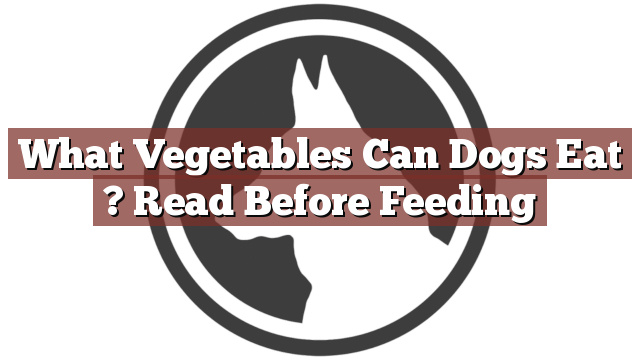Understanding Your Dog’s Dietary Needs
As a responsible dog owner, it is essential to understand your furry friend’s dietary needs. While dogs are primarily carnivores, they can also benefit from incorporating certain vegetables into their diet. Vegetables provide a range of essential nutrients, vitamins, and minerals that contribute to a balanced and healthy diet for your dog. However, it is crucial to know which vegetables are safe for your dog to consume and in what quantities.
What Vegetables Can Dogs Eat? Read Before Feeding
Can dogs eat vegetables? The answer is yes, but not all vegetables are suitable for your canine companion. Some vegetables are safe and can even provide health benefits to your furry friend. These include carrots, peas, green beans, pumpkin, sweet potatoes, and spinach. However, it is important to note that not all vegetables are safe for dogs to consume. Certain vegetables, such as onions, garlic, and tomatoes, can be toxic to dogs and should be strictly avoided. It is always recommended to consult with your veterinarian before introducing new vegetables to your dog’s diet.
Pros and Cons of Feeding Vegetables to Dogs
Feeding vegetables to your dog can have several advantages. Firstly, vegetables are a great source of fiber, which can aid in digestion and promote a healthy bowel movement. They also provide a variety of vitamins and minerals that can support your dog’s overall well-being. Additionally, incorporating vegetables into your dog’s diet can help in weight management and prevent obesity.
However, there are some potential drawbacks to consider. While vegetables can be a healthy addition to your dog’s diet, they should not replace their primary source of nutrition, which is meat. Dogs require a high-protein diet, and vegetables alone may not provide sufficient protein. Moreover, certain vegetables, such as broccoli and cauliflower, can cause digestive issues and gas in some dogs. It is crucial to introduce new vegetables gradually and monitor your dog’s reaction to ensure they are tolerating them well.
Conclusion
In conclusion, dogs can eat certain vegetables, but it is important to know which ones are safe and appropriate for them. Carrots, peas, green beans, pumpkin, sweet potatoes, and spinach are some vegetables that can be beneficial for your dog’s health. However, onions, garlic, and tomatoes should be avoided as they can be harmful to dogs. Always consult with your veterinarian before making any significant changes to your dog’s diet and introduce new vegetables slowly to avoid any adverse reactions. By understanding your dog’s dietary needs and making informed choices, you can ensure they receive a well-balanced and nutritious diet.
Thank you for taking the time to read through our exploration of [page_title]. As every dog lover knows, our furry friends have unique dietary needs and responses, often varying from one canine to another. This is why it's paramount to approach any changes in their diet with caution and knowledge.
Before introducing any new treats or making alterations to your dog's diet based on our insights, it's crucial to consult with a veterinarian about [page_title]. Their expertise ensures that the choices you make are well-suited to your particular pet's health and well-being.
Even seemingly harmless foods can sometimes lead to allergic reactions or digestive issues, which is why monitoring your dog after introducing any new food item is essential.
The content provided here on [page_title] is crafted with care, thorough research, and a genuine love for dogs. Nevertheless, it serves as a general guideline and should not be considered a substitute for professional veterinary advice.
Always prioritize the expert insights of your veterinarian, and remember that the health and happiness of your furry companion come first.
May your journey with your pet continue to be filled with joy, love, and safe culinary adventures. Happy reading, and even happier snacking for your canine friend!

